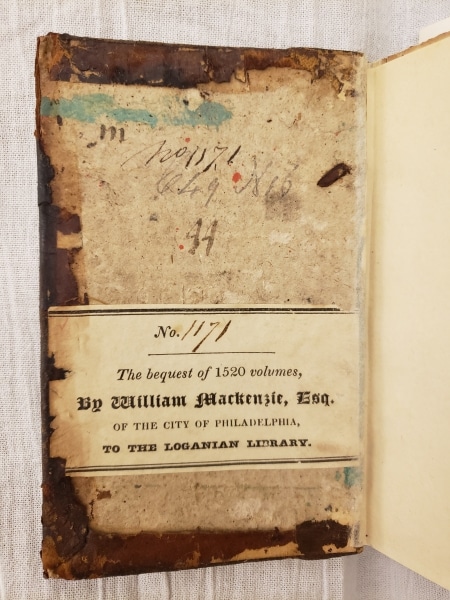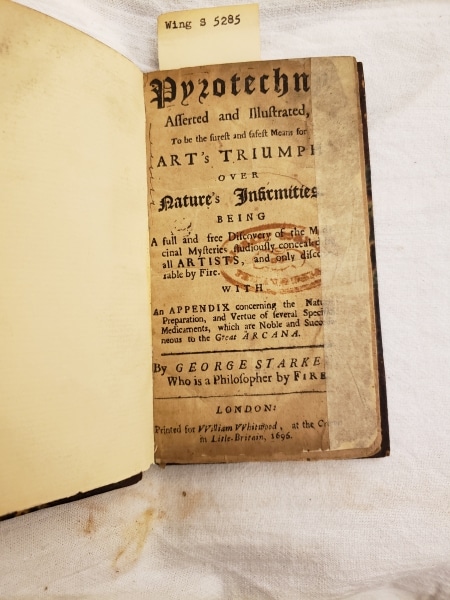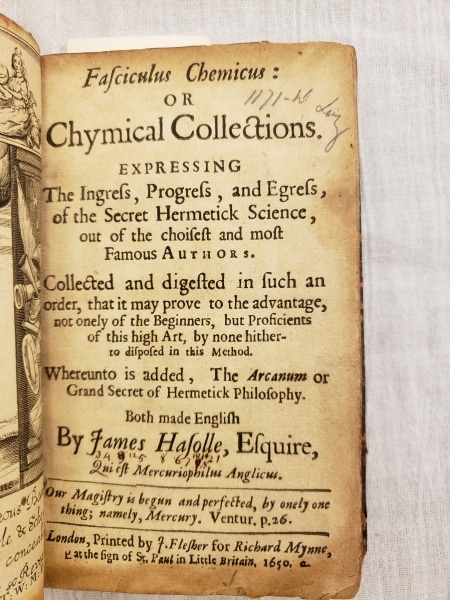Benjamin Franklin and Alchemy
Megan Piorko
I came to the Library Company of Philadelphia on a research fellowship to explore the connections between Benjamin Franklin and his copy of the English edition of Fasciculus Chemicus (1650). I defended my dissertation, which examines Fasciculus Chemicus and its author Arthur Dee as a case-study into seventeenth-century alchemical medical and textual culture, just a few days prior to starting at the Library Company. I began my research with the broad goal of expanding the scope of my dissertation to become a book project, and came up with the following questions: What was Benjamin Franklin’s interest in seventeenth-century alchemy? What role do alchemical texts play in his personal collecting practices? How does early modern alchemy fit with his intellectual worldview? What can be gleaned about colonial American reception of alchemy more broadly?
My month-long research fellowship yielded some interesting results to these questions. A preliminary look into the alchemical texts owned by Franklin showed that there seemed to be no particular reason for collecting the alchemical texts in his personal library, nor were they shelved near one another to create a sub-genre. (Edwin Wolf II discovered Franklin’s unique shelf-marks consisting of a case number followed by a volume number. Franklin began using this organizational system after his 1785 visit to Paris.) However, there are a few congruencies between these texts and his broader colonial knowledge-sharing practices. Of the five seventeenth-century alchemical texts that can be definitively connected to Franklin’s library, all but one are English editions and all are printed in London. Accessibility for the ‘regular hard-working American’ was important to Franklin, so he preferred English editions of texts (A catalogue of books belonging to the Library Company of Philadelphia, xi). Otherwise, Franklin’s namesake and favored uncle had a significant library which was dispersed in London and Franklin bought some of his uncle’s books from London booksellers. This led me to assume that Franklin’s unenthusiastic acquisition of a few seventeenth-century alchemical texts was likely just a vestige of his desire to acquire books from his uncle’s library.
However, upon a lead from Library Company librarian James Green, I discovered that Franklin had a direct interest in alchemy, and in one seventeenth-century alchemical text in particular: George Starkey’s Pyrotechny (1696). In a letter dated December 22, 1745 Franklin writes to his bookdealer, William Strahan, about books he ordered for the public library and follows with, “Please to add to the enclos’d List the following Books for me, viz. Starkey’s Pyrotechny asserted, an old Book” (Franklinpapers.org). This text is held by the Library Company today and has no available provenance information. Four additional Starkey texts are in the Library’s collections with Mackenzie provenance, who was known to have bought texts previously belonging to Franklin’s personal library, including the other alchemical texts with Franklin’s shelf-marks. Thus, it is likely that the copy of Starkey’s Pyrotechny presently held by the Library Company of Philadelphia was also part of Franklin’s personal library. The letter is dated forty years before he began using his shelf-mark system, which would explain the lack of the telltale marginalia.
George Starkey (1626-1665) wrote under the pseudonym of Eirenaeus Philalethes, and was a Bermuda-born, colonial American alchemist. While it is noteworthy that Franklin showed a personal interest in American alchemy, rather than European alchemy, I wanted to get a broader sense of eighteenth and nineteenth-century American reception of early modern alchemy from the Library’s collections. One of the rare books that I called (based on its title) was Remarks upon Alchymists by “an officer of the United States Army” printed in Pennsylvania in 1855. To my utter surprise and delight, the short text opens with a personal anecdote from the author which took place a year prior, “I strolled one day into Bangs’ Auction Bookstore, in Chatham street, New York… and I observed among [the books] a small volume with the word “Arcanum” on the back of it.” He then goes on to describe what is, without a doubt, a copy of the 1650 English edition of Fasciculus Chemicus. He recalls in detail his experience of happening upon this text and buying it for one dollar. The author shares his inner monologue of reading Fasciculus Chemicus, culminating with his interpretation that alchemy is not about a Philosophers’ Stone at all, but that is a symbol for Wisdom.
My short month at the Library Company of Philadelphia’s reading room included dead-ends, new leads, and happy accidental discoveries that are part and parcel of historical research. I look forward to exploring further Benjamin Franklin’s interest in George Starkey and this exciting new chapter in the story of the long-life of Fasciculus Chemicus.
Thank you to Connie King, Jim Green, and Will Fenton for their support during my research fellowship.
Megan Piorko is the Allington Post-Doctoral Fellow at the Science History Institute and a 2020-21 Andrew W. Mellon Foundation Fellow at the Library Company of Philadelphia. She is currently revising her dissertation, Chymical Collections: Seventeenth-Century Textual Transmutations in the work of Arthur Dee, into a book manuscript.





